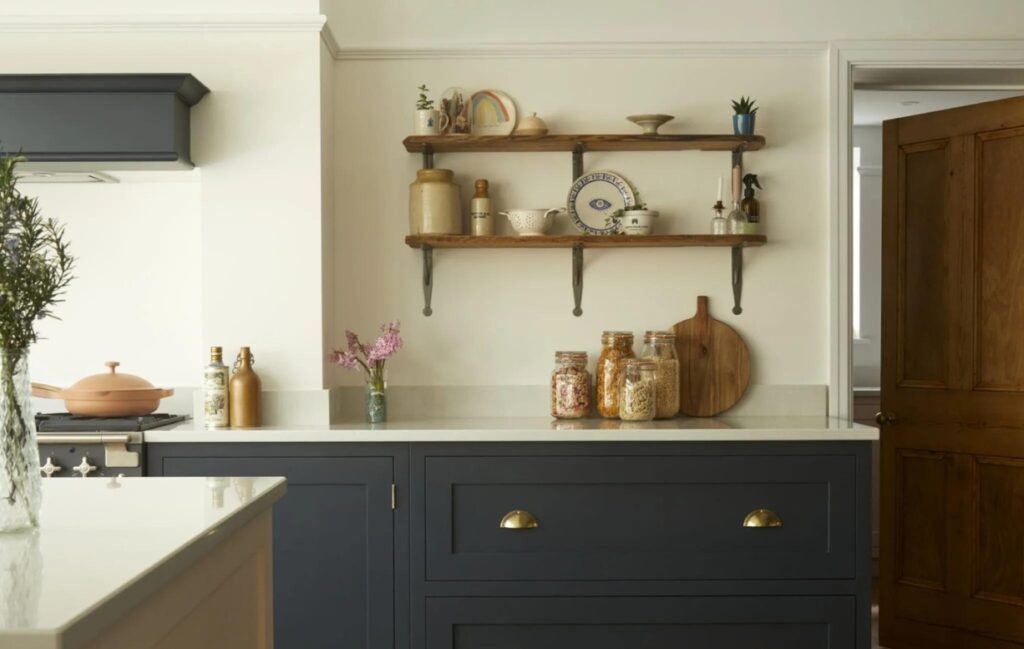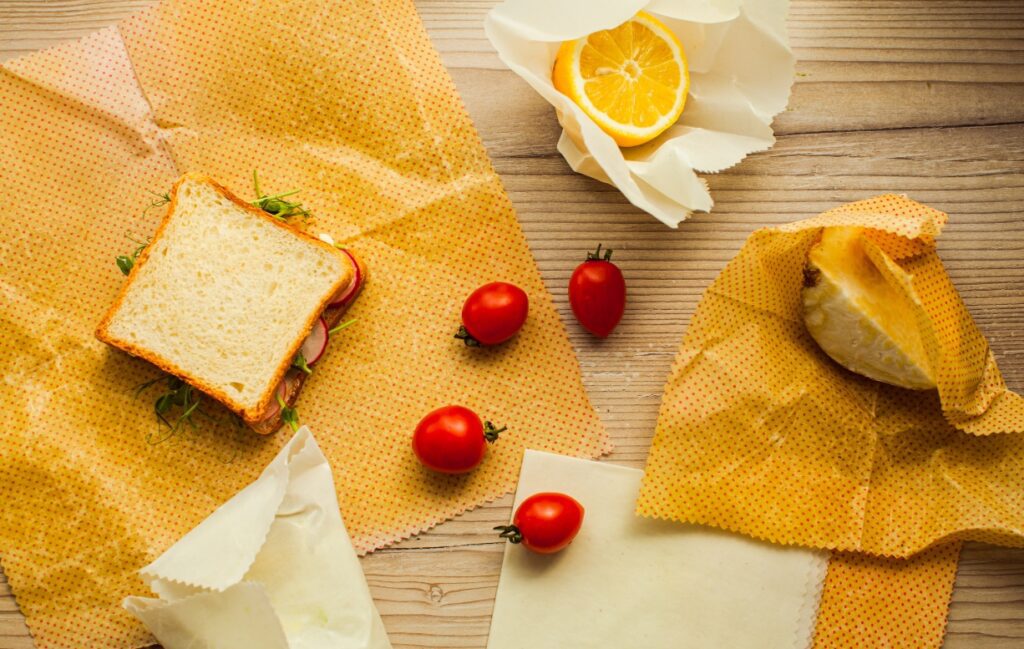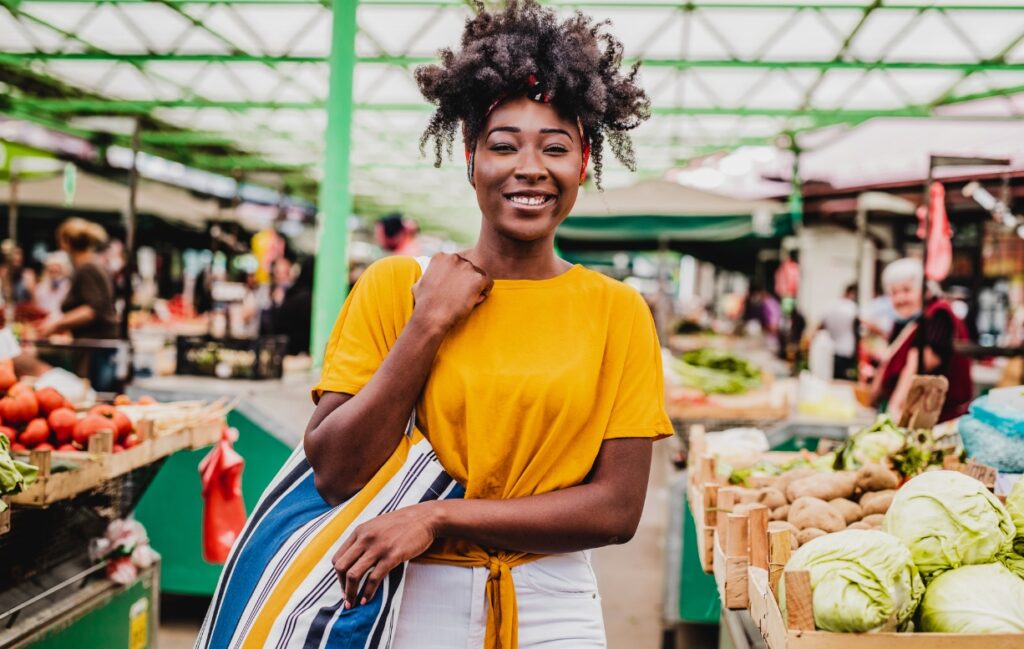
Let’s face it, the kitchen isn’t exactly the most planet-conscious room in the house, even if things are getting better by the day. You only need to take one glance around your food-prepping space and you’ll spot a collection of energy-chugging appliances: refrigerator, dishwasher, oven, stove, kettle and coffee maker. And then there are the kitchen habits we’ve slipped into without much consciousness given to the repercussions, as we fill our fridges and cupboards with convenient plastics that are either unrecyclable or thrown away after one use.
But even though we’re not experts on climate change or the environment, establishing techniques, methods and processes that champion sustainability has been a passion we’ve pursued since we first opened our Olive and Barr workshop. It’s part of our promise when it comes to providing the best shaker kitchens in the UK.
We use local woods as our favoured natural resource, build all of our kitchens in the UK to reduce our carbon footprint, minimise our emissions and only use carefully-sourced materials that are accredited by the FSC to ensure they are both traceable and accountable. And that’s just the start. We also take our timber off cuts and use them to heat our workshops, remove and recycle all of our packaging after we’ve fitted your kitchen and have a team that are continually looking for new ways to make our processes as environmentally-conscious as possible.
However, there is one area of kitchen life that is both out of control and incredibly damaging to the planet, and that is single use plastics; plastics that are a hassle to recycle, a million years from being biodegradable and, in some cases, not safe to cook or store food in. So with that in mind, we have curated a list of simple ways to reduce plastic use in your kitchen.
Use Reusable Shopping Bags
Remember when supermarkets and stores had to start charging 10p for a single-use plastic bag and almost-everyone let out a collective groan? Well, they did the right thing, and now we find ourselves groaning when we forget to bring our reusable shopping bags with us. The trick is to make it a habit. Dedicate one of your kitchen drawers to tote bags made of canvas or jute, have a handful of backups strategically placed in the boot of your car, add a reminder to the bottom of your shopping lists, and remember these eco-friendly alternatives aren’t just great for the planet, but have other benefits too. They’re stronger, longer-lasting, can hold more weight and are less likely to tear. By using reusable shopping bags, we can make a positive impact on the environment while also enjoying the convenience and benefits they offer.

Choose Containers Wisely
When it comes to storing foods and ingredients in your kitchen, start choosing glass mason jars or stainless steel containers instead of plastic ones – and the reasons why are almost endless. Of course, the major plus is they help reduce waste by eliminating the need for single-use plastic containers, something that’s not only better for our beautiful planet, but will also save you money in the long run. They’re also made of durable materials such as glass or metal, meaning you can use them over and over without them losing their shape, even if you pop them in the microwave and dishwasher. But the cherry on top is their aesthetics. Whether it’s a wall of open shelves or a larder, using mason jars to store your dry foods is a way to add charm, character and personality to your space.
It’s All About That Bulk
There’s something incredibly satisfying about turning up to a refill store with your own reusable containers to purchase your favourite everyday items in bulk, a little change that can make a huge difference. Think trail mix and dried fruit, olive oil, spices, rice, detergents, honey, vinegar, soap and more. That’s a lot of plastic you’re preventing from ending up in landfill or the ocean, as you step further into the world of sustainability and start taking plastic-free trips to the grocery store.

Use Beeswax Wraps
Made from cotton infused with beeswax, jojoba oil and tree resin, these wraps are both reusable and biodegradable. Yet they’re also great for storing food, keeping it fresh and stopping any unwanted contamination. That’s right. Unlike plastic wraps, beeswax wraps do not contain harmful chemicals that can leach into our food, making them a healthier option. Additionally, they are easy to clean and can be used for up to a year with proper care. What we’re trying to highlight is, by using beeswax wraps instead of cling film or whatnot, we can reduce our plastic consumption, support sustainable practices and protect the planet – and it’s so simple.
Avoid Bottles and Bottle Caps
A list about single use plastics would not be complete without mentioning one of the worst culprits of them all, plastic bottles and they’re tops. To lay it out plainly, drink bottles and bottle caps are the second most common plastic pollutants after cigarette butts, according to the UN Environment Program. Luckily, the solution here is easy. Embrace the idea of a reusable water bottle and start using a reusable coffee cup. Not only do they tend to have extra features, such as interchangeable caps or the chance to flavour your water, but they’re also safer for you than plastic.
Choose Eco-Friendly Cleaning Products
When we design our handcrafted cabinets, especially our under-the-sink storage solutions, we envisage them full of eco-friendly cleaning products, something that has become oh-so-popular in recent years. And the reason they’ve become so popular is our collective awareness of the negative impact of harsh chemicals on both the environment and our health. They’re products made from natural and renewable ingredients, such as plant-based oils, essential oils and vinegar, all of which are biodegradable and non-toxic. Flip that coin over and you’ll find traditional cleaning products release harmful chemicals into the air that can cause respiratory problems and other health issues, meaning eco-alternatives are also safer for pets and children. What’s more, most eco-friendly products champion sustainability through and through, so they’ll usually come in reusable or recyclable packaging, reducing waste and helping to protect the environment.

Avoid Buying Packaged Foods
Stroll down the aisles of any supermarket and you’ll discover a world of plastic packaging. Almost everything is wrapped in plastic or another kind of non-recyclable material, adding to the waste problem; waste that ends up in landfills where it can take decades to decompose. Luckily, the solution is packed full of wonderful benefits. You see, by choosing fresh, whole foods, you’re not only reducing your waste-footprint, but you’ll be living a more healthy life too. And the benefits don’t stop there because choosing fresh foods tends to mean supporting local farmers and small businesses. Farmer’s markets, artisan chefs, butchers, bakers and candlestick makers (okay, maybe not that last one, but you get the point). This is one of those small changes you can make to your daily life that can make a big difference in the world around you. Now grab your reusable containers and pop down to the farmer’s market to buy in bulk.
Become a Better Recycler
Recycling is a crucial part of protecting the environment, but it takes a little more than just throwing any old plastic in your recycling bin. It requires a conscious effort to do more. It’s about educating yourself, learning what can and cannot be recycled in your area, reducing the amount of waste you produce by choosing products with less packaging or purchasing in bulk and properly preparing your recyclables. This might sound like a chore, but in reality it’s just a matter of rinsing your food containers, removing lids, flattening cardboard boxes to maximise space in the recycling bin keeping non-recyclable items out of the recycling bin to avoid contamination.
As we said at the beginning of this blog, when we first scrawled the words Olive & Barr on a piece of recycled paper, we made a promise to always be a fair, responsible and ethical company that championed sustainability through every part of the process. That promise still stands and you can see it in everything we do – including the words we write.
Thanks for reading. For more kitchen designs and cooking inspiration, follow us on Instagram and Facebook.